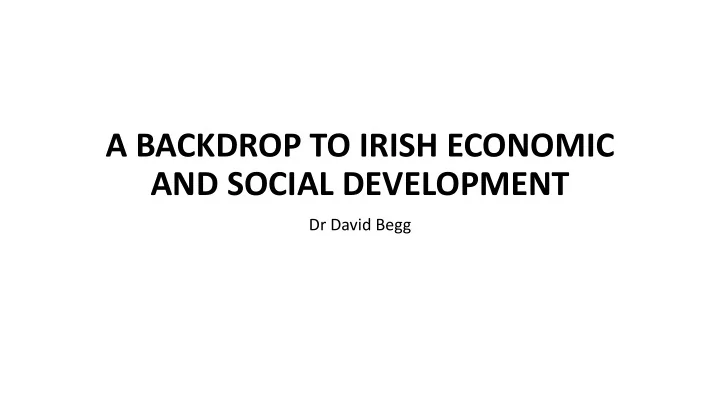

A BACKDROP TO IRISH ECONOMIC AND SOCIAL DEVELOPMENT Dr David Begg
SCOPE OF THE PRESENTATION • Ireland’s recent economic history • The Irish case in a comparative context • Ireland, Brexit and Europe – contemporary challenges
1988
THE IMF COMES TO TOWN
Ir Iris ish h Econo nomic ic Growth, wth, 1989-2009 2009 Source: Fitzgerald & Kearney (2013:5) ESRI
IRELAND AND THE 2008 FINANCIAL CRISIS • Ireland had a plain vanilla property and banking crisis • ‘Soft Landing’ hypothesis blown away by Lehman’s crash • Ireland did not have a crisis of its public finances … debt/GDP Ratio = 25% • Tax base too dependent on property = 13%
Banking Crisis
ECONOMIC RECOVERY The position of the Irish economy in Spring 2017 as summarised by ESRI: • GDP growth forecast at 3.8% in 2017 and 3.6% in 2018 • Growth will be driven by consumption and investment • Unemployment continues to fall and is forecast to reach 5.6% by end 2018.
SOCIAL POLICY ISSUES • Significant deficits in healthcare and housing provision arising from austerity • Demographic change will impact (but less than in other EU countries) • Unaddressed issues of childcare and pensions • Need for large scale capital investment in infrastructure
IRELAND IS CHANGING • Influence of Catholic Church has waned • Referendum on abortion in 2018 • Gay marriage now legal following referendum in 2016 • Ireland has just elected a 38 year old gay man who is a second generation immigrant as Prime Minister
EXISTENTIAL CHALLENGES • High level of uncertainty surrounding Brexit and US protectionist policies • A small open economy particularly reliant on international trade is highly vulnerable to significant changes in international trading conditions.
IRELAND AS AN OUTL TLIER IN EUROPE • Most geographically isolated. • Foreign policy based on ‘Multi-interface Peripheral Economy’ concept. (Ruane, 2010). • Economy cycles out of phase with the rest of Europe (Smith, 2005). • A liberal market economy with counter tendencies (O’Riain, 2004). • Neither a pure consensus nor a majoritarian political system (Lijphart, 1999). • Limited political interest in European integration.
BREXIT AND ITS DANGERS • The impact of a hard Brexit on trade with Britain (estimated at 3-4% of GDP over 10 years • Impact on the common travel area and single labour market • Concern re. Northern Ireland: - Fragility of the peace settlement - Possibility of a ‘Frictionless’ land border between EU and Britain? - The continued viability of Ireland’s multi-interface periphery (MIP) development model?
THE AGE OF RADICAL UNCERTAINTY “The financial crisis turned what outwardly seemed a stable political and financial environment into what mathematicians and physicists would call a “dynamical” system. The main characteristic of such systems is radical uncertainty. Such systems are not necessarily chaotic – though some may be – but they are certainly unpredictable. You cannot model them with a few equations. The best you can do is to identify spots of instability and stay away from them, muddle through and keep your eyes wide open”. Wolfgang Munchau – FT 19/6/2017
Recommend
More recommend